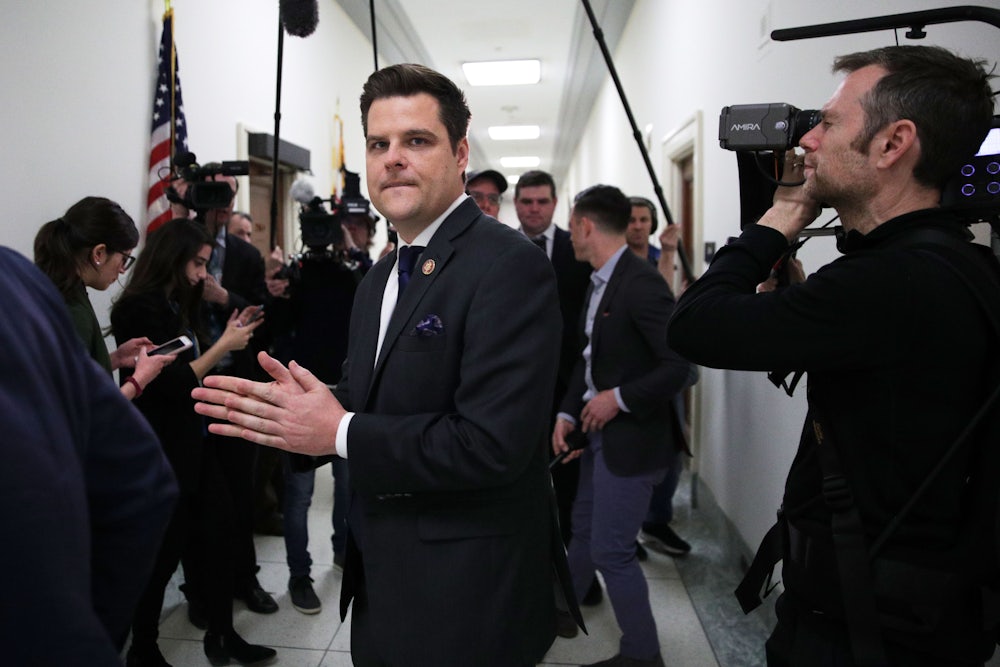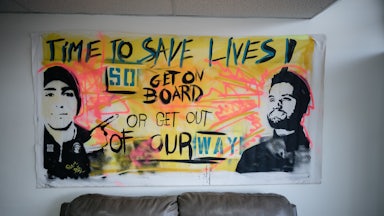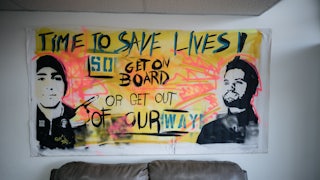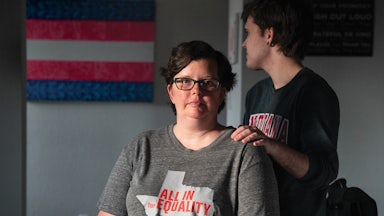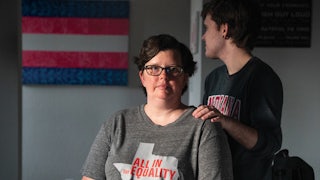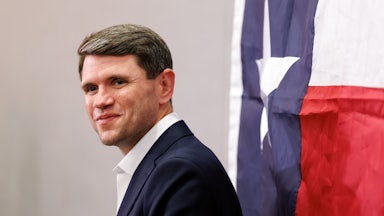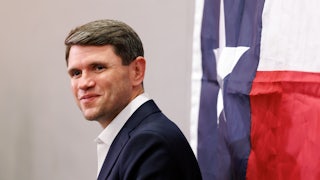In 2019, when Alexandria Ocasio-Cortez was getting sworn in as the youngest congresswoman in U.S. history, an anonymous right-wing Twitter account leaked a video of her dancing on a rooftop with her college friends. It was a wan attempt to embarrass the lawmaker, the idea seemingly being that branding “America’s favourite commie” as a “nitwit” for some cheesy dancing was some kind of burn. Whatever the leaker’s intention was, the effort backfired; if anything, it only elevated AOC’s rising rock-star-like status among younger voters. She responded to the video by doing her own little shimmy of a dance outside her new office.
The episode left something of an impression on another young representative, who had just been sworn in to his second term in the House of Representatives. Clearly dazzled by the congresswoman’s popularity, he told told Politico a few days later that he aspired to be the AOC of the right, but with the added caveat: “I can’t dance for shit.”
The admittedly shitty dancer is the representative from Florida’s 1st district, Matt Gaetz. Like AOC, Gaetz is something of a populist voice in his own party. But rather than follow Ocasio-Cortez in pointing the finger at big business interests and political misinformation as twin ailments of American democracy, Gaetz takes every opportunity to blame the “woke mob,” China, and immigrants for their nefarious designs on America. The positioning works for Gaetz: His rhetoric sits comfortably with his constituents, who come from one of the oldest and whitest congressional districts in America. In 2020, Florida had the second-highest percentage of population over the age of 65, and his district is 71 percent white compared to 59 percent nationally.
Gaetz has also managed to charm his way into the congressional and national spotlight over the last six years. He shows no sign of letting up: He helped to derail Kevin McCarthy’s hope for a swift ascension to speaker of the House.* Gaetz is now driving a trillion-dollar game of chicken against Democrats over raising the debt ceiling. The political grandstanding appears to be paying off: He won reelection to Florida’s 1st district with almost 68 percent of the vote, despite having to fend allegations of child sex trafficking. He has even been alluded to as a potential presidential candidate in 2024.
At every opportunity the congressman consistently prioritises his own political reputation as a hard right-winger over the best interests of the country, aspiring to be a “cool kid” of the new right. But the adoration of conservatives and the celebrity he’s cultivated can only go so far when the demographic he represents—namely, older MAGA supporters—have no need for rock stars.
Rock stars gain crowd followings because they represent the voices of a generation trying to find its place in a world that is dominated by the political priorities of its elders. What Gaetz’s supporters want is to feel that they’re justified in their rage at a changing world—rage specifically aimed at the young, liberal, and nonwhite voters who are quickly outnumbering boomers and will soon enough be the ones primarily shaping the future of a country and forcing their elders from their hard-won ideological turf. Tying your political livelihood to this constituency can be a potent brew if your national ambitions run through The Villages. Although Gaetz is technically a millennial, his future is, for the time being, fallow, and his big ideas could become less viable as soon as the demographic that elected him becomes a political minority.
It’s a fear that’s backed up by numbers. Despite the condescending quote falsely attributed to Winston Churchill about young people becoming conservative by the age of 35, young Americans are increasingly bucking both this expectation and historical trends by not turning more conservative as they age. This trend doesn’t come out of nowhere. The GOP has grown more and more alienated from younger voters. From 1992 to 2018, the share of the youth vote going to Democrats rose to 67 percent from 55 percent. After the 2018 midterms, exit polls demonstrated that this divide had gotten very pronounced; in 2022, it was young voters who were credited with turning aside the GOP’s expected “red wave.” (Many Republicans responded by grousing about the voting age.)
None of this arose in a vacuum. Millennials
and Gen Zs have come of age in a time when the cards are stacked against them;
their politics are a tea steeped in ruinous wars abroad and a financial
collapse at home. College degrees
that boomers once got for cut-rate prices are now shackling students to a life
of immiserating debt. Skyrocketing housing prices are keeping those who do not
come from inherited wealth from owning homes.
And the rent remains too damn high. When Ocasio-Cortez first moved to Washington at the age of 29, she was ridiculed by a Fox News presenter because she couldn’t immediately find an apartment. Perhaps this was catnip for aging cable news viewers. But AOC’s experience was hardly alien to the young. Rents in major U.S. cities have risen by an average of 14 percent in the past two years, and many young people have been squeezed out of affordable housing. A typical apartment in Washington, D.C., rents for over $2,500 a month—much more than most young people, new to the city, could afford on a waitress’s salary before drawing a congressional paycheck. If conservatives want to ensure their continued ideological existence, it would behoove them to spend less time mocking the plight of young professionals and more time ameliorating our affordable housing crisis, if only because homeowners tend to be more likely to vote conservative.
The ideological chasm between AOC’s and Gaetz’s supporters is most visibly reflected in the way they interact with their supporters. Ocasio-Cortez strives for raw authenticity in addressing her constituents on social media, and makes a concerted effort to take her supporters behind the curtain to explain how Washington really works and what she does to represent their interests. Ocasio-Cortez knows where to find young voters online, and she seems to understand their unique needs: They need someone to cut them in on what they’re owed, some small measure of political power that they didn’t inherit when they came of age.
Gaetz’s hard-core fans get something different—grandstanding. In September, after Hurricane Ian swept through Florida, causing an estimated $50 billion in damage, Gaetz didn’t call for legislation to curb the effects of man-made climate change or try to size up the future needs of the Sunshine State. Instead, the Florida congressman took to the airways to demand that Florida homeowners receive relief funds to the tune of “like half of what you sent Ukraine,” two days after joining Republicans in voting against a spending bill that included disaster relief for Florida. Naturally, those homes will be rebuilt in Florida in any event, only to be destroyed anew by rising sea levels and increasingly potent storms down the line. Ocasio-Cortez understands that the young remain in the path of the coming storms; Gaetz’s bread is buttered by those who’ve already clambered to higher ground. One must wonder: How much larger will the Republican youth gap have grown by the next time votes are counted?
* This article originally misidentified Gaetz as a member of the Freedom Caucus.
